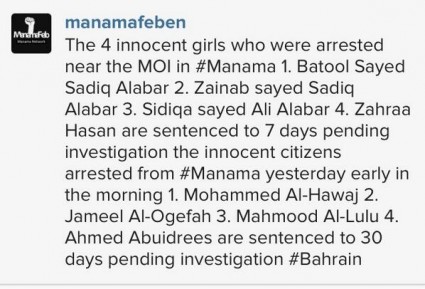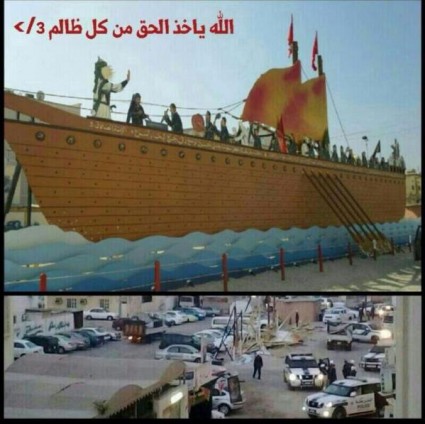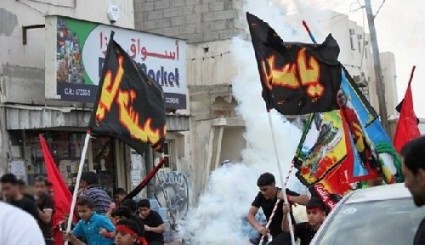The Olive Tree is the foundation of the home and target of Zionist Settlers
 Palestinian Farmer looks at Olive Tree Destroyed by Zionists in Hate Crime
Palestinian Farmer looks at Olive Tree Destroyed by Zionists in Hate Crime
‘The olive tree is the foundation of the home’
By Matthew Vickery – 6 November, 2013
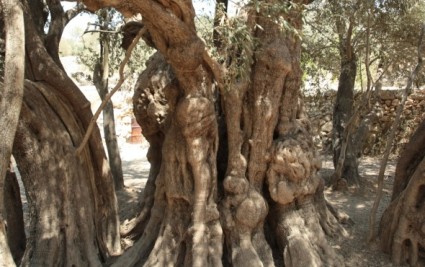
The trunk of the Al-Badawi tree, claimed to be the oldest olive tree in the world.
‘The olive tree is the foundation of the home’, I was first told this phrase by a farmer in Al-Walaja village in the West Bank two years ago, while we attempted to make our way towards the village’s fields and olive trees. They had been stolen by the Israeli government to make way for a nearby illegal Israeli settlement. Israeli Defence Force (IDF) soldiers predictably stopped us and pushed us back, preventing us from going any further. During this year’s olive harvest, this scene is being repeated time and again in the occupied Palestinian territories, often with dangerous aggression from IDF soldiers and Israeli settlers, or through the settlers directly destroying the trees.
The olive tree is the symbol of Palestine, of sumud (steadfastness): the ability to hold on and stand your ground against all odds. Indeed, olive trees have the potential to live for thousands of years and it is Al-Walaja where arguably the oldest olive tree in the world resides. Named Al-Badawi (The Old One), it has been dated to an age of between 4,000-5,000 years.
The olive trees that dot the West Bank have provided an income to Palestinians, generation after generation, and as such, they are valued members of the family.
It is during olive harvest that this phrase always comes back to me, kick-starting my thoughts about the olive trees’ relationship with the foundations of the Palestinian home and family life, often both built on the steadfastness of the olive tree. The olives that are sold from the tree, which survives harsh winters and dry summers, provide when economic times are tough, when other income channels have failed. It is a tree, a simple and, by itself, rather straight-forward tree, yet the relationship between it and the families living in the West Bank is special.
Yet my optimism is always cut short – as happens frequently when I think about issues regarding Palestine. My mind may wander among the trees for a few minutes while passing the olive groves on shared services (shared taxis) in the West Bank, yet suddenly the olive trees stop and the stumps begin. Trees cut down because of the separation wall, a part-wall, part-fence structure created by the Israeli government citing ‘security’ reasons; yet hundreds of thousands of Palestinians remain on the ‘Israeli’ side.
In many cases, trees that were uprooted could have been given back to Palestinian families and replanted, but companies involved with the Wall project and financed by the Israeli government instead decided to sell a huge quantity of them.
Olive trees unfortunate enough to grow near illegal Israeli settlements or the Wall continue to be routinely uprooted by the army. It is not unusual for Israeli settlers to burn the olive trees near their settlements that have survived the gaze of the military; anyone who has watched the Oscar-nominated Five Broken Cameras may well be aware of this.
It may be just a tree, but the olive tree is a metaphor for Palestinian resistance, for their steadfastness and their generosity despite their situation (a situation which neither the UN nor the ‘international community’ seems to have the will to truly and fairly resolve). But just like the olive trees in the West Bank, Palestinians are rooted to this small part of the world, and often only to their own small districts; they are subject to the axe of an aggressive military, one that reduces trees to stumps, and people to ashes.
…source
November 13, 2013 No Comments
The Assault on Medical Neutrality and the Use of Weaponized Tear Gas in Bahrain
Medical Neutrality and the Use of Weaponized Tear Gas in Bahrain
September, 2013 – Physicians for Human Rights
Protecting Patients and Physicians From Attack in Bahrain
The Bahraini government’s response to the early 2011 pro-democracy protests was brutal, systematic, and violent. In addition to birdshot and rubber bullets, government law enforcement attacked unarmed protestors with toxic chemical agents including tear gas. The government’s crackdown on the medical profession was especially harmful, as security forces arrested and detained doctors, raided
health facilities, and obstructed patients from receiving necessary care. Physicians for Human Rights (PHR) calls for all perpetrators of abuse to be held accountable.
During the pro-democracy uprisings that began in early 2011, health workers on the frontline had first-hand knowledge of government attacks on peaceful protesters. As a result of their efforts to provide unbiased care for wounded protesters, the government initiated systematic and targeted attacks against medical personnel.
In April 2011, PHR launched an investigation in Bahrain after government authorities began to systematically target, abduct, detain, and torture physicians and station military forces in health facilities.
PHR’s report, Do No Harm: A Call for Bahrain to End Systematic Attacks on Doctors and Patients, was instrumental in compelling the U.S. government to include Bahrain in a list of major human rights violators in a formal submission to the UN Human Rights Council.
In addition to egregious violations to the principle of medical neutrality, the Bahraini government police forces have used enormous amounts of weaponized chemical agents, including tear gas, on protestors and other civilians. PHR’s 2012 report, Weaponizing Tear Gas: Bahrain’s Unprecedented Use of Toxic Chemical Agents Against Civilians, chronicles health effects and human rights violations associated with the inappropriate and excessive use of weaponized chemical agents. In this report, PHR found that Bahrain’s misuse of toxic chemical weapons was endangering the health of civilians and causing long-term pain and suffering. …more
November 13, 2013 No Comments
Bahrain Regime Tramples Religious Rights During Ashoura
Bahrain: Authorities Promoting Sectarian Tensions by Targeting Shia Muslims During Ashoura
10 November, 2013 – Bahrain Center for Human Rights
The Bahrain Center for Human Rights and the Bahrain Youth Society for Human Rights express grave concern in regards to the targeted attacks on Shia Muslims in Bahrain by security forces during the religious period of Ashoura.
Since the beginning of the Islamic month of Muharram, security forces have led provocative attacks on several Shia Muslim neighborhoods in Bahrain. Pictures and videos show them taking down religious flags and banners that were placed earlier on homes and religious centers as part of the annual season for Shia Muslims commemorating the “martyrdom of Imam Hussain”, the grandson of the Prophet Mohammed.
On 4 Nov 2013, riot police attacked a group of people participating in a religious procession in Maameer, which have taken place in Bahrain for decades. The riot police used excessive tear gas against dozens of people that included elderly citizens and children. People of all ages participate in these processions given that they do not expect to be attacked as they are not political protests.
Furthermore, several citizens received police summons without a name specified on the summon, stating only “for the house’s owner”, due to placing Ashoura flags or banners on their own homes.
Additionally, the Government of Bahrain blocked a website which does live broadcasts of the religious events of Ashoura from over 30 areas in Bahrain HERE
The BCHR and BYSHR regard the above mentioned targeting and attacks as violations of freedom of religion, freedom of expression, and a practice of discrimination against Shia’s with the intent to further cause a sectarian split in the society and push towards to sectarian violence.
These practices are not new and the BCHR had documented similar attacks in the past (Nov 2012 report HERE ), however due to the culture of impunity, and the policy of discrimination, the harassment against Shia Muslims continues through judicial means.
The BCHR and BYSHR respectfully reminds the Government of Bahrain of Article 18 of the Universal Declaration for Human Rights: “Everyone has the right to freedom of thought, conscience and religion”.
Maryam Al-Khawaja, the Acting President of the Bahrain Center for Human Rights, said: “All sects and religions must be respected in Bahrain; that includes religious events. The Government of Bahrain is trying to purposely instigate a violent response from Shia Muslims by targeting them during an important religious period; and we have previously warned of the consequences of pushing people towards sectarian animosity. Allies of the Government of Bahrain must apply pressure for the immediate halting of sectarian based targeting; and promote respect for all religions and sects equally.”
The Bahrain Center for Human Rights calls on the United States, the United Kingdom, the United Nations and other allies and international institutions to pressure the Bahraini authorities to:
1. Immediately end the systematic attacks on religious liberties.
2. Immediately stop all forms of sectarian attacks and/or promotion of sectarian tensions/violence.
3. Immediately investigate and hold accountable those who gave orders, overlooked and/or carried out attacks on religious liberties.
4. Guarantee freedom of religion to all religions and sects in Bahrain.
November 13, 2013 No Comments
Shameful Day in UN History – Violator, Terror State, Saudi Arabia Elected to UN Human Rights Council
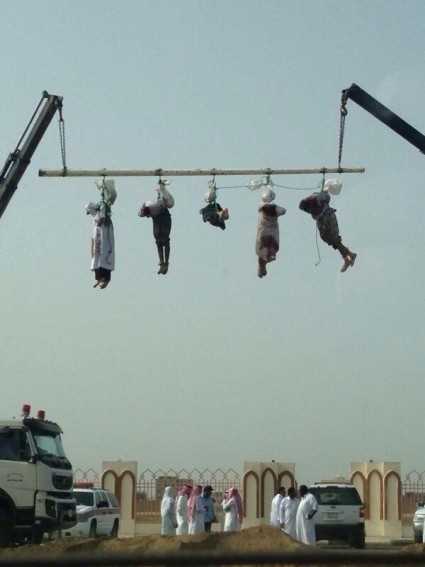
Saudi Arabia Be-headings for Crimes Ranging from Apostasy to Sorcery
Saudi Arabia is said to be the world’s largest source of funds for Salafi jihadist terrorist militant groups, such as al-Qaeda, the Afghan Taliban, and Lashkar-e-Taiba in South Asia, and donors in Saudi Arabia constitute the most significant source of funding to Sunni terrorist groups worldwide, according to US Secretary Clinton. According to a secret December 2009 paper signed by the US Secretary of State, “Saudi Arabia remains a critical financial support base for al-Qaida, the Taliban, LeT and other terrorist groups.”
Kingdom of Saudi Arabia wins seat on UN rights body
By GHAZANFAR ALI KHAN – 12 Novemebr, 2013 – Arab News
Saudi Arabia was elected Tuesday to the Human Rights Council, the UN’s highest rights watchdog body, for a three-year term following a secret ballot voting at the UN General Assembly in New York.
“The Kingdom, which garnered 140 votes, will begin its term in January,” said Rolando Jomez, a spokesman of the UN Human Rights Council, while speaking to Arab News, from New York.
Senior Saudi officials, especially those associated with human rights organizations, expressed joy over the news. Saleh Al-Kathlan, deputy chief of the Riyadh-based National Society of Human Rights, said: “The vote was expected in the light of the progress made by Riyadh in the field of human rights since it was first elected to that UN body in 2009.”
Dr. Ibrahim Al-Quaiyid, a member of the NSHR, said: “We are happy over the Kingdom’s election to the 47-member body whose role is to promote universal respect for human rights and fundamental freedoms.”
Al-Quaiyid added: “Saudi Arabia … has taken several initiatives to promote and protect human rights … this will give a chance to the Kingdom to play a global role in the domain of human rights promotion. Definitely, the country has had some grey areas as evident from our own reports, but Riyadh has addressed and will further redress all concerns.”
He said the commitment of the Saudi leadership and a set of stringent legislations to ensure protection to the life and property of its citizens and residents are major steps in this field, while referring to the creation of high-powered human rights organizations besides political and civil rights associations in Saudi Arabia during the past few years. …source
November 13, 2013 No Comments
Two Bahrain Policemen await affirmation of their impunity by Bahrain Courts of Injustice
Two policemen face trial for maltreatment of detainees
10 November, 2013 – 24×7 News
Public Prosecution
Two policemen allegedly involved in three cases of maltreatment will appear before the court on November 25, 2013 to face charges, Chief Prosecutor and head of the Special Investigation Unit (SIU) Nawaf Abdullah Hamza in a statement confirmed.
The Public Prosecution charged the first defendant with aggressing two detainees and demanded his trial under articles 4/75 and 1 and 2 /339 of the penal code.
It also charged the second defendant with assaulting one of the accused as he was arrested and demanded his trial under the provisions of the same articles.
The probe panel has also interrogated seven people accused of maltreatment.
Witnesses were heard into the complaints which were lodged in October, which triggered an official inquiry.
In another development, Al-Wefaq Society Liberties and Human Rights Chief Hadi Al-Mousawi appeared before the probe panel regarding the torture and maltreatment claims and alleged statistics he had posted online.
However, he failed to produce evidence corroborating his cyber allegations, claiming the complainants themselves retracted and refused to report the cases.
The investigation unit also summoned Yusuf Al-Mahafdha regarding his torture and maltreatment claims and alleged statistics, which he posted on social websites.
However, the claimant failed to appear before the probe panel to hear his allegations, although notified officially three times.
A (SIU) reported to the Dry Dock detention centre last Wednesday (November6) to hear a number of detainees and gauge their conditions in police custody.
These include Hussain Jaafar Ibrahim Hubail, who was remanded in custody by court order for his involvement in a criminal case.
The detainee, who is under treatment, admitted receiving medication regularly, reporting some delay at times.
The prison authorities were ordered to administer him the necessary medication on time and cautioned against any delay.
The Chief Prosecutor and head of the Special Investigation Unit (SIU) said that the measures undertaken in this regard would be followed up closely. …source
November 13, 2013 No Comments
Bahrain MOI, Please DO NOT let your Criminal Police Force, Rape or Injure these Girls
November 13, 2013 No Comments
Bahrain Police Destroy Religous Displays Attack Processions During Muharram
November 13, 2013 No Comments

